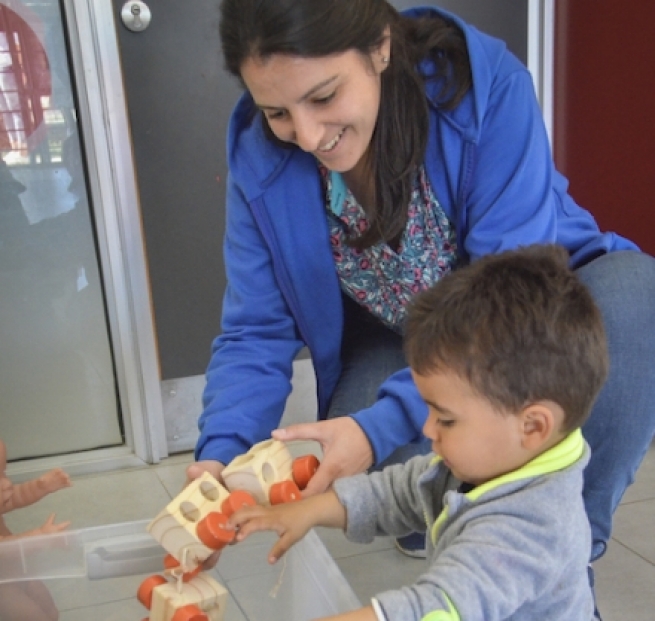URUGUAY: Staff at the Mamma Margherita Mother and Child Care Center continues to reach out and provide resources at a distance during the quarantine

(MissionNewswire) The Mamma Margherita Mother and Child Care Center, which is part of the Domenico Savio Institute in the Ituzaingó neighborhood in Uruguay, had just opened five months prior to the coronavirus pandemic. While regulations won’t allow the Salesian child care center to accommodate children and their families onsite during the quarantine, the team of educators continues to be attentive to their multiple needs.
During normal operations, the center served 108 children (1-2 years old) and their families. In addition to the care and educational programs provided, all were offered food, including breakfast, lunch and afternoon snacks, and snacks for children staying eight hours.
The staff at the center has continued to find ways to support these families even at a distance. Coordinator Camila Gil said, “From Monday, March 16 on, following regulations, we stopped taking care of the children in the center and started reaching out to the families by telephone. From these calls, we learned that some parents have lost their jobs or started having health problems. In cases where we have identified the greatest need, we have supported them with food, first by supplying them with the food cooked in the day, and then by delivering baskets of dry food, fruit and vegetables. Through WhatsApp, we also send information on social benefits, prevention measures, and emergency numbers in case of health problems or violence.”
Salesians in Uruguay and around the globe continue to find ways to support children and families in need during this difficult time. Salesians have been working with youth in Uruguay for many years, providing educational and social development opportunities to help them break the cycle of poverty and lead productive lives.
Uruguay has managed to decrease its poverty rate by almost half since 2007. Today, the poverty rate is close to 10 percent with the majority of poor residents concentrated in rural towns and villages.
Most rural citizens in the country do not have the financial resources or education and training necessary to find and maintain stable employment. Running a profitable business venture or maintaining a small farm with access to the national and international markets is increasingly competitive and remains largely out of reach, especially in households run by women alone. The majority of rural poor are those most often engaged in non-agricultural activities.
In addition to a lack of education and employment opportunities, access to affordable housing is a concern for many poor families in Uruguay. Many do not have the resources to purchase homes or land to build on, and schools are often so far away children cannot attend.
Youth crime is on the rise in the country. More than 35 percent of crime committed by adolescents can be traced back to a lack of educational opportunities and employment inequality, according to a recent study by the Center for the Study of Economic and Social Reality. The report also noted that crime rates among young people in Uruguay have doubled over the past 15 years and the rate of violent assaults has quadrupled.
###
Sources:
ANS Photo (usage permissions and guidelines must be requested from ANS)
Salesian Missions – Uruguay
World Bank – Uruguay





